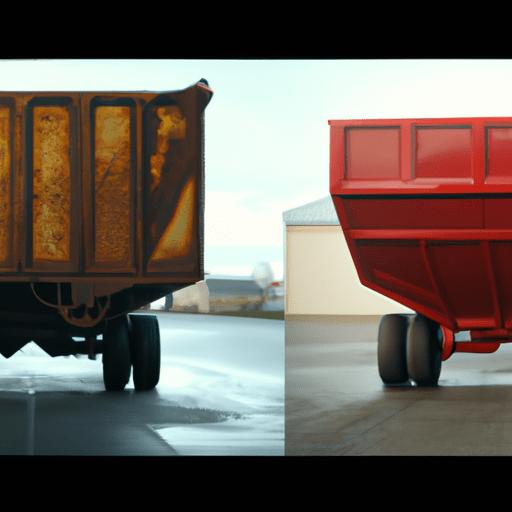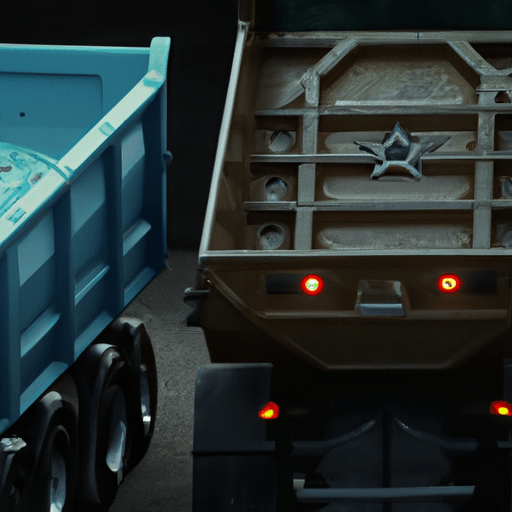-
Table of Contents
Introduction
Dump trailers and traditional trailers serve as essential tools in various industries, providing efficient means of transporting materials and goods. This comparative study aims to analyze the key differences between dump trailers and traditional trailers, delving into their respective features, applications, advantages, and limitations. By examining their distinct characteristics, this analysis will offer valuable insights for potential users to make informed decisions when selecting the most suitable trailer type for their specific needs and requirements.
Comparing Dump and Traditional Trailers: A Comprehensive Trailer Comparison Guide
Dump trailers and traditional trailers are both essential tools for transporting goods and materials. However, they serve different purposes and have unique features that make them suitable for specific tasks. This comprehensive trailer comparison guide will help you understand the differences between dump trailers and traditional trailers, and determine which one is best suited for your needs.
Dump trailers, as the name suggests, are designed to dump their contents quickly and efficiently. They are equipped with a hydraulic lift system that allows the trailer bed to tilt, enabling the materials inside to slide out easily. This feature makes dump trailers ideal for transporting loose materials such as gravel, sand, and soil, as well as bulk items like mulch and firewood. They are commonly used in construction, landscaping, and agricultural industries, where the ability to unload materials quickly and efficiently is crucial.
Traditional trailers, on the other hand, are designed for general-purpose hauling and do not have the dumping capabilities of dump trailers. They come in various shapes and sizes, including flatbed, enclosed, and utility trailers. Traditional trailers are versatile and can be used to transport a wide range of items, from furniture and appliances to vehicles and equipment. They are commonly used by homeowners, businesses, and recreational enthusiasts for moving, storage, and transportation purposes.
One of the main differences between dump trailers and traditional trailers is their loading and unloading capabilities. Dump trailers are specifically designed for easy unloading, making them the ideal choice for transporting loose materials. The hydraulic lift system allows for quick and efficient dumping, saving time and effort compared to manual unloading. Traditional trailers, however, require manual loading and unloading, which can be time-consuming and labor-intensive, especially for heavy or bulky items.
Another key difference between the two types of trailers is their construction and durability. Dump trailers are typically built with heavy-duty materials, such as steel or aluminum, to withstand the rigors of transporting heavy loads and frequent dumping. They often feature reinforced walls and floors to prevent damage from the impact of materials being loaded and unloaded. Traditional trailers, while still built to be durable, may not have the same level of reinforcement and heavy-duty construction as dump trailers. This makes them more suitable for lighter loads and less frequent use.
When it comes to cost, dump trailers tend to be more expensive than traditional trailers due to their specialized features and heavy-duty construction. However, the investment may be worth it if you frequently transport loose materials and require the efficient unloading capabilities that dump trailers provide. Traditional trailers, being more versatile and less specialized, are generally more affordable and can be a cost-effective option for those who need a trailer for occasional use or for transporting a variety of items.
In terms of maintenance, both types of trailers require regular upkeep to ensure their longevity and performance. Dump trailers may require more frequent maintenance due to their hydraulic lift systems and the wear and tear from frequent dumping. Traditional trailers, while not as specialized, still need regular inspections and maintenance to keep them in good working order.
In conclusion, the choice between a dump trailer and a traditional trailer ultimately depends on your specific needs and requirements. If you frequently transport loose materials and need a trailer with efficient unloading capabilities, a dump trailer may be the best choice for you. However, if you require a versatile and cost-effective option for transporting a variety of items, a traditional trailer may be more suitable. By understanding the differences between these two types of trailers, you can make an informed decision and choose the right trailer for your needs.
Conclusion
In conclusion, dump trailers and traditional trailers serve different purposes and have distinct advantages and disadvantages. Dump trailers excel in transporting and unloading bulk materials efficiently, while traditional trailers offer versatility and ease of use for a wider range of cargo. Ultimately, the choice between the two depends on the specific needs and requirements of the user.


